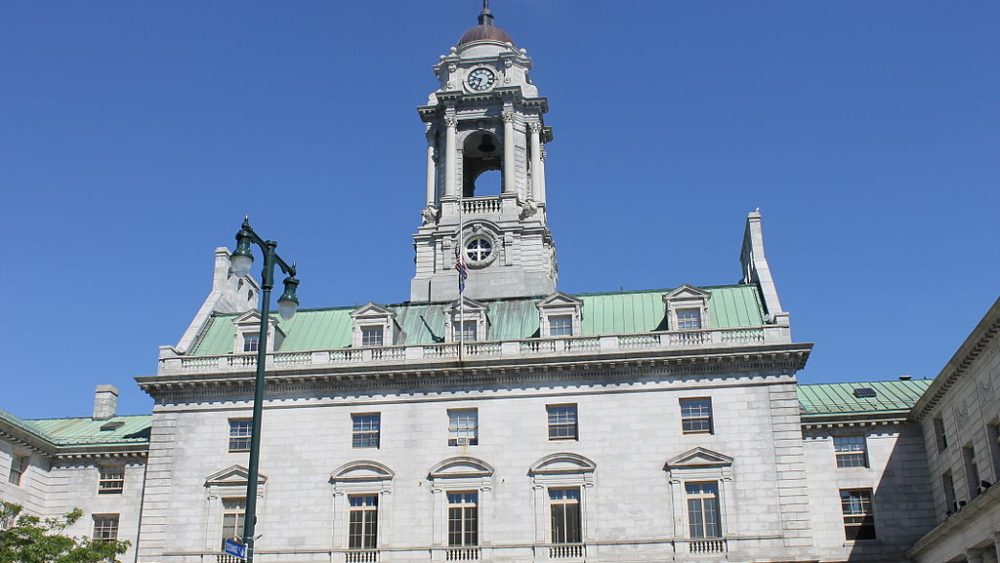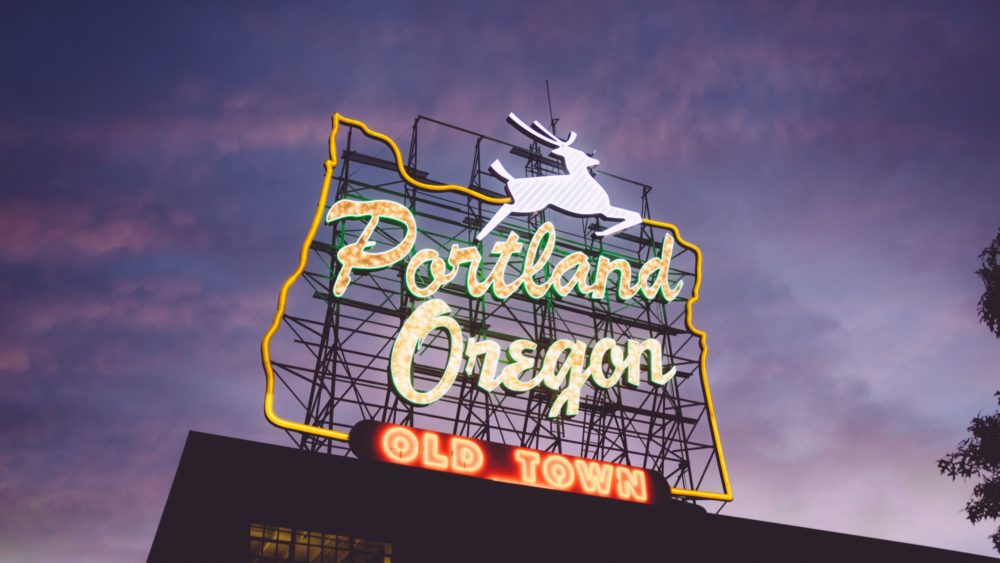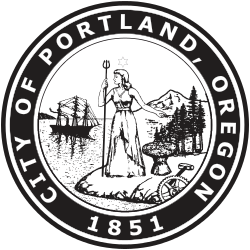November 9, 2022 •
Portland, Maine Voters Approve Clean Election Program, Ethics Commission, and Ranked Choice Voting

City Hall in Portland, ME - by: Billy Hathorn
Voters passed seven of 13 ballot questions including measures to establish a clean elections program, ranked-choice voting, an ethics commission, and a code of ethics. The new campaign finance rules prohibit corporate contributions to candidates for city office and prohibit […]
Voters passed seven of 13 ballot questions including measures to establish a clean elections program, ranked-choice voting, an ethics commission, and a code of ethics.
The new campaign finance rules prohibit corporate contributions to candidates for city office and prohibit ballot question contributions or expenditures from any entity under foreign influence.
The city will use a proportional ranked choice voting method for elections in which more than one person is to be elected to a single office.
City Council will form an independent ethics commission and then adopt a code of ethics as recommended by the commission.
December 13, 2021 •
New Rule Changes to Portland’s Small Donor Program

The City of Portland’s Open and Accountable Elections Program has voted and accepted new administrative rules for candidates participating in the program. The new rules change the name of the program to the Small Donor Elections Program. The new guidelines […]
The City of Portland’s Open and Accountable Elections Program has voted and accepted new administrative rules for candidates participating in the program.
The new rules change the name of the program to the Small Donor Elections Program.
The new guidelines clarify candidate reporting requirements and address any sections of the program left to the Portland Elections Commission in the code.
The commission set the limit on seed donations to $500 per entity.
Seed money contributions are allowed to be made by any legal entity, including corporations.
June 4, 2021 •
Portland Adopts New Auditor Administrative Rules

The city of Portland adopted new and amended Auditor Administrative Rules (ARAs) following a public comment period. The administrative rule changes are a result of previous litigation and court cases; a need for updating certain dollar amounts to comply with […]
The city of Portland adopted new and amended Auditor Administrative Rules (ARAs) following a public comment period.
The administrative rule changes are a result of previous litigation and court cases; a need for updating certain dollar amounts to comply with the City Charter’s inflation updates; and from a year of experience implementing the relatively new regulations.
The changes add guidance for social media communications and provide guidance on when and what information may be required in political campaign disclosures.
January 9, 2020 •
Portland Commissioner Fish’s Passing Triggers Special Election
Commissioner Nick Fish passed away on January 2, creating a vacant council seat. The Portland City Council chose the May 19 municipal primary election date for a special election to fill the vacancy. Potential candidates would have to wait until […]
Commissioner Nick Fish passed away on January 2, creating a vacant council seat.
The Portland City Council chose the May 19 municipal primary election date for a special election to fill the vacancy.
Potential candidates would have to wait until March 10 to file for Fish’s position.
If no candidate receives more than 50% of the vote, the top two vote-getters would face each other in a runoff election on November 3.
December 9, 2019 •
New Portland, Oregon Lobbying Administrative Rules in Place

The Portland Auditor has announced administrative rule changes to the city’s lobbying regulations. The revised rules clarify the definition of lobbying to include grassroots lobbying and attempts to gain goodwill. Fiscal disclosures are required to include expenses related to grassroots […]
The Portland Auditor has announced administrative rule changes to the city’s lobbying regulations.
The revised rules clarify the definition of lobbying to include grassroots lobbying and attempts to gain goodwill.
Fiscal disclosures are required to include expenses related to grassroots lobbying.
The rule changes also provide guidance on governments registering as lobbying entities if certain types of lobbying occur.
Governments will be considered lobbying entities when certain outside individuals lobby on their behalf.
The regulation changes also exclude certain cultural gifts from the city’s lobbying registration and reporting requirements if the market value of the gift cannot be easily determined and declining the gift is likely to cause offense.
Additionally, the revised rules provide guidance on when lobbying groups and city officials may be fined for late filings.
The auditor’s office will issue a warning notice for late filings.
Reports must be filed within 24 hours after the deadline or a late fee will be assessed up to $500 per report.
October 22, 2019 •
Portland Auditor Updates Proposed Lobbyist Regulation Changes, Opens Public Comment Period

After reviewing public comments, the Portland Auditor has further revised and offered clarification to proposed rule changes to the city’s lobbying regulations. The amended rules are available at https://www.portlandoregon.gov/auditor/proposedrules. An additional public comment period will be open until November 18.
After reviewing public comments, the Portland Auditor has further revised and offered clarification to proposed rule changes to the city’s lobbying regulations.
The amended rules are available at https://www.portlandoregon.gov/auditor/proposedrules.
An additional public comment period will be open until November 18.
September 11, 2019 •
New Portland Campaign Funding Rules in Place

The Portland Auditor has announced new campaign finance disclosure and contribution requirements and a new public campaign financing program. Committees must now timely file disclosures of financing for certain election communications advocating for or against a city candidate. Additionally, committees […]
The Portland Auditor has announced new campaign finance disclosure and contribution requirements and a new public campaign financing program.
Committees must now timely file disclosures of financing for certain election communications advocating for or against a city candidate. Additionally, committees must provide names of individuals or other entities contributing to the committees.
Entities making more than $750 in independent expenditures to support or oppose city candidates must now register with the secretary of state as a political committee or independent expenditure filer and provide certain disclosures.
Public and private employers must now allow employees to donate to political committees through payroll deduction if they allow similar post-tax deductions for other purposes.
The public campaign financing program will require candidates to agree to limit individual contributions to $250 or less and abide by other fundraising limits. Qualified candidates will receive a six to one match for campaign contributions of $50 or less.
Candidates will not be required to participate in the program.
The new disclosure rules went into effect Wednesday, September 4. City candidates are eligible to qualify for the public campaign finance program on Thursday, September 12.
August 22, 2019 •
Portland Auditor Opens Public Comment Period for Proposed Lobbying Regulation Changes

The Portland Auditor has opened the public comment period for the proposed administrative changes to the city’s lobbying regulations. The revised rules clarify lobbying including grassroots lobbying and attempts to gain goodwill. Fiscal disclosures will be required to include expenses […]
The Portland Auditor has opened the public comment period for the proposed administrative changes to the city’s lobbying regulations.
The revised rules clarify lobbying including grassroots lobbying and attempts to gain goodwill.
Fiscal disclosures will be required to include expenses related to grassroots lobbying.
The proposed rule changes will also provide guidance on governments registering as lobbying entities if certain types of lobbying occur.
Governments will be considered lobbying entities when certain outside individuals lobby on their behalf.
The regulation changes will also exclude certain cultural gifts from the city’s lobbying registration and reporting requirements if the market value of the gift cannot be easily determined and declining the gift is likely to cause offense.
City officials will not be required to report certain ceremonial, hand-made, or other culturally specific gifts.
However, such gifts must still be accepted on behalf of the city and documented in accordance with city rules.
Additionally, the revised rules will provide guidance on when lobbying groups and city officials may be fined for late filings.
The auditor’s office will issue a warning notice for late filings.
Reports must be filed within 24 hours after the deadline or a late fee will be assessed up to $500 per report.
The public comment period will be open until September 23.
June 14, 2019 •
Judge Strikes Down Portland Campaign Finance Limits

Multnomah County Circuit Judge Eric Bloch struck down voter-approved limits on campaign donations to candidates running for county offices. Judge Bloch’s ruling stated the $500 limit on donations violates Oregon’s expansive free expression guarantees in the Oregon Constitution. The decision […]
Multnomah County Circuit Judge Eric Bloch struck down voter-approved limits on campaign donations to candidates running for county offices.
Judge Bloch’s ruling stated the $500 limit on donations violates Oregon’s expansive free expression guarantees in the Oregon Constitution.
The decision mirrors one the judge issued in March 2018 striking down limits for Multnomah County races, citing a 1997 Oregon Supreme Court decision.
Judge Bloch upheld portions of the voter-approved campaign rules that require Portland political advertisements to prominently disclose their top five financial backers.
Supporters of the law say they will appeal the decision.
January 15, 2019 •
Portland Mayor Proposes Voting, Lobbyist Disclosure Rules
Mayor Ethan Strimling announced he will propose changes to city elections, seeking public funding for local campaigns and new lobbyist disclosure rules. Strimling’s new initiatives will demand elected officials disclose meetings with lobbyists and other influencers. The initiatives will also […]
 Mayor Ethan Strimling announced he will propose changes to city elections, seeking public funding for local campaigns and new lobbyist disclosure rules.
Mayor Ethan Strimling announced he will propose changes to city elections, seeking public funding for local campaigns and new lobbyist disclosure rules.
Strimling’s new initiatives will demand elected officials disclose meetings with lobbyists and other influencers.
The initiatives will also reiterate calls to allow noncitizens living in the city legally the right to vote in local elections, as well as urge the city to implement ranked-choice voting in City Council and school board races.
Strimling said he plans to work with the City Council and other stakeholders to develop the details of his proposals over the year.
December 7, 2018 •
Portland Mayor Enacts Voter Approved Campaign Finance Measure
Mayor Ted Wheeler submitted to City Council a proclamation stating the recently passed campaign finance ballot measure is enacted and in effect. The Honest Elections City of Portland Charter Amendment prohibits corporate contributions and limits contributions from individuals and committees […]
 Mayor Ted Wheeler submitted to City Council a proclamation stating the recently passed campaign finance ballot measure is enacted and in effect.
Mayor Ted Wheeler submitted to City Council a proclamation stating the recently passed campaign finance ballot measure is enacted and in effect.
The Honest Elections City of Portland Charter Amendment prohibits corporate contributions and limits contributions from individuals and committees to $500 per election cycle.
The measure also caps independent expenditures and is likely to face legal challenge.
City Council is expected to submit the measure to the local circuit court for validation early next year.
In 1997, the Oregon Supreme Court struck down statewide campaign finance limits as a violation of free speech protection outlined by the Oregon Constitution.
November 8, 2018 •
Citizens of Portland Vote to Limit Large Political Contributions
Portland, Oregon voters passed a campaign finance measure to limit large political campaign contributions. The amended charter limits independent expenditures to an aggregate of $5,000 per individual and an aggregate of $10,000 per political committee, provided contributions to the committee […]
 Portland, Oregon voters passed a campaign finance measure to limit large political campaign contributions.
Portland, Oregon voters passed a campaign finance measure to limit large political campaign contributions.
The amended charter limits independent expenditures to an aggregate of $5,000 per individual and an aggregate of $10,000 per political committee, provided contributions to the committee by individuals does not exceed $500 per individual per year.
The campaign limits are vulnerable to legal challenge. In 1997, the Oregon Supreme Court struck down statewide campaign finance limits as a violation of free speech protection outlined by the Oregon Constitution.
Prior to the passage of this measure, the City of Portland adopted a public finance system by City Council vote.
It provides matching funds to eligible candidates for mayor, city commissioner, and auditor with funding to begin in the 2019-2020 election.
December 5, 2016 •
Portland City Council to Consider Campaign Finance Ordinance
On December 7, Portland City Council will consider the proposed Open and Accountable Elections package to create a public campaign finance matching system, increase penalties for willful violations of election laws, and improve contribution reporting requirements. The ordinance would put […]
 On December 7, Portland City Council will consider the proposed Open and Accountable Elections package to create a public campaign finance matching system, increase penalties for willful violations of election laws, and improve contribution reporting requirements.
On December 7, Portland City Council will consider the proposed Open and Accountable Elections package to create a public campaign finance matching system, increase penalties for willful violations of election laws, and improve contribution reporting requirements.
The ordinance would put the Office of Neighborhood Involvement in charge of enforcement. The proposal originally sought to place the task of enforcement on the Auditor’s Office, which administers elections; however, Auditor Mary Hull Caballero challenged the idea as a violation of the city’s charter.
June 22, 2016 •
Portland, Oregon to Reconsider Ethics Reforms
Today the Portland City Council is scheduled to reconsider adopting new ethics reform measures to broaden the revolving door prohibition to two years and increase the penalties associated with repeated ethics violations. The proposal would also close a loophole in […]
 Today the Portland City Council is scheduled to reconsider adopting new ethics reform measures to broaden the revolving door prohibition to two years and increase the penalties associated with repeated ethics violations.
Today the Portland City Council is scheduled to reconsider adopting new ethics reform measures to broaden the revolving door prohibition to two years and increase the penalties associated with repeated ethics violations.
The proposal would also close a loophole in registration requirements, requiring lobbying entities that spend more than $1,000 a quarter on lobbying activities to register.
The proposed ordinance is a compromise that is less restrictive than a similar ordinance that was introduced in April 2016.
State and Federal Communications, Inc. provides research and consulting services for government relations professionals on lobbying laws, procurement lobbying laws, political contribution laws in the United States and Canada. Learn more by visiting stateandfed.com.

